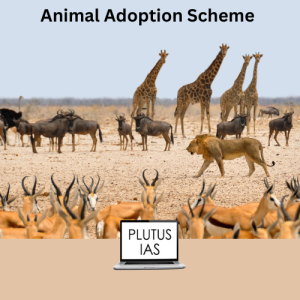07 Oct Animal Adoption Scheme
Animal Adoption Scheme
The topic is based on the Indian Environment. The article talks about the Indian Environmental ecology, Bio-diversity, and Climate Change significance of the Animal Adoption Scheme.
Prelims: General issues on Environmental ecology, Bio-diversity, and Climate Change – that do not require subject specialization.
Mains: General Studies III: Conservation, environmental pollution, and degradation, environmental impact assessment.
Why in the headlines?
- Delhi Zoo, the National Zoological Park has launched an Animal Adoption Scheme, which will allow people to sign up to pay for the care of animals at the facility.
- This scheme was introduced for the very 1st time at Zoo and it is to “encourages the participation of people in wildlife conservation.” Started by the director of Zoo Dharam Deo Rai.
About the animal adoption scheme
- The forms will be available on the official website of the National Zoological Park.
- Those who want to adopt or support any animal of their choice can enter into an agreement with zoo management after.
- The person can pay the National Zoological Park, New Delhi, through Account Payee Cheque, Demand Draft, Credit or Debit Card.
- After the registration process is done the adapter will have a membership card mentioning his name and the animal’s name that s/he has adopted.
- The adopter will be allowed to enter the zoo during visiting hours, but only once a month on showing the membership card
- Also, the adopter will not be allowed to visit the zoo during any outbreak of pandemic or any zoonotic disease

Pic: Animal Adoption Scheme
Rate list:
- The range will start from Rs 700 for birds, per year
- Rs 600000 for lions, tigers, and rhinos, elephants per year
- For leopards, it will be around 360,000 per year
- For sambar dear, swamp deer, or some extraordinary hornbill, it will be around Rs 40,000 per annum.
- For Indian wolf, it will be Rs 18,0000 per year
- And for Indian Bison or Guar at Rs 2,25000 per year.
Validity of the membership card
- The validation of the membership card last for 1 or 2 years, after that the adopter can renew or withdraw the membership.
- But the given money will not be refunded in any way. The revenue which will be generated from the adoption of animals will go back to the zoo on a quarterly basis for the welfare activities of the animals and its personnel.
Implementation of the scheme
In 2013 the adoption schemes were reopened in Sanjay Gandhi national park of Maharashtra under the Central Zoo Authority,
The adoption scheme is not only bound for Zoo only
What is Central Zoo Authority
- The Central Zoo Authority is a statutory body under MoEFCC
- In effect, the Wildlife (Protection) Act, of 1972 was amended to establish Central Zoo Authority (CZA) as a statutory body under the Ministry of Environment & Forests in 1992.
- There is a chairman in the authority, ten members, and a Member Secretary.
- Each and every zoo in the country is required to get recognition from the Authorities for its operation.
The function of the CZA
- Identifying the minimum standards for housing, upkeep and veterinary care of the animals kept in zoos.
- Check and assess the functioning of the zoos as per the prescribed standards or norms.
- Recognize or derecognize zoos.
- Recognization of endangered species of wild animals for purposes of captive breeding.
- Provide technical and financial support to such zoos which have the potential to attain the desired standard in animal management.
- Regulate the exchange of animals of the endangered category listed under Schedule-I and II of the Wildlife (Protection) Act among zoos.
- The exchange of animals between Indian and foreign zoos is approved by the Authority before the requisite clearances under EXIM Policy and the CITES permits are issued by the competent authority.
How it will help
- Contribution from the adoption of animals will help them to get better food, enclosed encroachments, and renovations
The adoption scheme would bring public corporate bodies and institutes closer to their love and care for the captive animal’s Sources
Source:
Daily Current Affairs for UPSC
In the present era, current affairs become a part and parcel of any competitive examination. By reading current affairs, you can gain knowledge of Social, economic, Global, Science, Technology, Politics, Sports, and other national and international news and enhance your general knowledge. So if you want to prepare for the UPSC, IAS, SSC, and other competitive examinations, you must read daily current affairs every day. Without reading new current affairs, you will not acquire knowledge of the national and international world.
Here, Plutus IAS provides the best current affairs for IAS, and UPSC examinations. Read IAS’s current affairs from our site.



No Comments